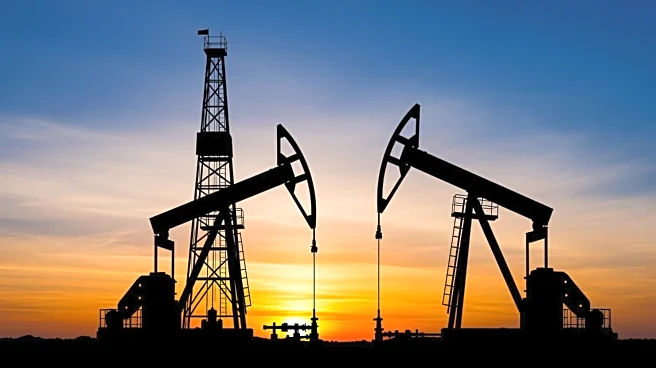What's Happening?
Petrobras, the Brazilian state-owned oil company, has announced an increase in its dividend payments for the third quarter, following a significant rise in production and earnings. The company reported
a net income of $6 billion for the quarter, marking a 2.7% increase year-over-year and a 27.3% rise from the previous quarter. This financial performance comes despite a decline in global oil prices by more than $10 per barrel. The increase in production was largely driven by record outputs from the Buzios field, which exceeded 1 million barrels per day in October. Overall, Petrobras' oil, natural gas, and NGL production averaged 3.14 million barrels of oil equivalent per day, an 8% increase from the previous quarter. The company's board has approved interim dividends totaling $2.27 billion, surpassing analyst expectations and significantly higher than the $1.6 billion paid in the second quarter.
Why It's Important?
The decision by Petrobras to increase dividends despite falling oil prices highlights the company's robust operational performance and strategic management. This move is significant for investors, as it demonstrates Petrobras' ability to generate shareholder value even in a challenging pricing environment. The increased production and export levels position Petrobras as a key player in the global oil market, particularly among non-OPEC+ producers. This development could influence global oil supply dynamics and potentially impact oil prices. For the U.S., which is a major player in the global energy market, Petrobras' performance could affect trade relations and energy policy considerations, especially in terms of import-export balances and energy security.
What's Next?
Petrobras' continued focus on increasing production capacity and efficiency may lead to further financial gains and shareholder returns. The company's strategic investments in new fields and production technologies could sustain its competitive edge in the global market. Stakeholders, including investors and industry analysts, will likely monitor Petrobras' future earnings reports and production updates closely. Additionally, any shifts in global oil prices or changes in OPEC+ production policies could influence Petrobras' operational strategies and financial outcomes.
Beyond the Headlines
Petrobras' performance underscores the broader trend of state-owned enterprises in emerging markets leveraging natural resources to bolster economic growth and investor confidence. The company's success in maintaining profitability amid price volatility may serve as a model for other oil-producing nations. However, this also raises questions about the environmental impact of increased fossil fuel production and the long-term sustainability of such growth strategies in the context of global climate change initiatives.










